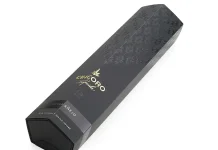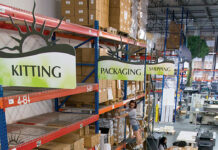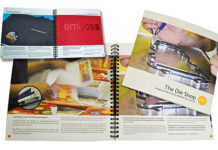by: Dianna Brodine
In Texas, everything is larger than life. Pecos Bill ropes the wind, the ghosts of the Alamo still echo, and the legends of the Old West stretch into stories that every child knows. In Houston, there’s a company that can tell a few tales of its own, with a determination to be the best and the confidence to back it up.
Reacting to the Customer’s Needs
Seidl’s Bindery is a full service bindery serving primarily the southeastern and southwestern United States. Purchased in 1986 by Bill and Jeannie Seidl, the bindery employed 24 staff members at that time. After facility expansions in 1992, 1997, and 2004, the company now operates with 125 employees over two full shifts, with the ability to work 24 hours a day.
Seidl’s Bindery offers a wide array of post press services, including PUR adhesive binding, Wire-O binding, plastic coil and spiral wire binding, saddle stitching, cutting, folding, fugitive and remoistenable gluing, diecutting, index tabbing, and more. The main structure covers about 60,000 square feet. “We’ve grown into it,” said Bill Seidl. “We kept expanding and now we have the whole building.” The bindery also has another 20,000 square feet off-site that is used for storage and manufacturing jobs for assembly or pack out.
The extensive range of service offerings demands a variety of on-site equipment. Seidl’s Bindery competes with two perfect binders – a Kolbus and Muller, both with PUR and Ota Binding. The facility also boasts two 42 inch high-speed diecutters with hot embossing, a Bobst Fuego 40 inch gluer with hot and cold glue and auto CD and DVD insertion, three Polar cutter systems, and a high-speed pick and place GaVehren tip-on machine, which is used for credit cards, magnets, overlays, signature tabbing, CDs, and more. The bindery also does in-house steel rule diemaking with a CAD/CAM system. “We put that in for response,” said Seidl. “When we got into the over 40 inch market, we had one press. We put in a second press, and then last year we put in another diecutter to relieve the pressure from the first two machines. We can react fast to the needs of our customers – the files come in, we open them up in the CAD system, check them and make adjustments, and don’t have to worry about driving a truck halfway across town to get another die.”
Keeping a bindery full of equipment running at peak performance is a necessity in order to meet customer deadlines. “We have a whole team of maintenance people – a master electrician, a machinist – it’s a seven-person team. If anything happens, from air conditioning to motors to electronics on the machines themselves, they can pretty much get it up and running again immediately. We keep a big stock of replacement motors and that type of thing. The accounting department thinks it’s kind of scary, what we keep on stock, but if you look at the expense of going down for eight hours, it’s worth it.”
Taking on the Tough Jobs
When Bill Seidl says “No is not an option”, listeners will hear a combination of Texas-sized confidence and ride-the-wind exhilaration at achieving the impossible. To meet that bold directive, risk taking becomes part of the daily equation, the available equipment takes on new significance, and employees become the key. Seidl knows that his bindery has distinguished itself by taking on the challenging projects. “When you first start out, you’re competing against everyone with vanilla ice cream,” explained Bill. When a tougher job comes along, “that’s your chance. If you can do this project that everyone says can’t be done, they’ll give you some of the easier stuff and you’ll build your business.”
When asked for an illustration, Seidl pointed to a job the bindery did in 2006 for a company in North Carolina. The company had been awarded a huge project, but was having trouble finding people to bind it. Seidl explained, “It took a little machine work. We had to reinvent some things in the machine shop, making the machine do something it wasn’t designed to do as far as size limitations, but we made it work.” The North Carolina company is now a valued customer.
For Seidl, the most important thing is to provide service to his customers, who are primarily printers. That service philosophy has led to adding on to the Bobst to give it the ability to auto-insert DVDs and CDs. Machines have been added for better diecutting and embossing. The pick and place GaVehren was added specifically to meet the needs for one customer and one project. “We try to never say ‘no’ to a project, even if it means investment in equipment,” said Seidl. “If we have the opportunity to get into a project from a customer that we feel that we can trust, give me 30 days and I’ll be up and running.”
A gift card for JC Penney is a prime example. “One of our customers called and said, “We have a project that’s over 50 million pieces.” I told them we knew how to do it and they said, “Good, because you’ve got the job.” We didn’t have the equipment at the time, but if we did not react to that opportunity, all our relationship-building over the last five years would have been gone. The Ga-Vehren machine hit the floor and two days after it hit, we were running at maximum speed. That was a good door opener for us – it got us into a completely new market.”
If the choice is to win the business or let it pass by, the decision to move ahead has been an easy one for Seidl. “We take ‘no is not an option’ as, at the least, ‘it can always be done’. We might not have the equipment, but we won’t hesitate to invest in a new highly-productive machine. What it comes down to is, are you willing to step up to the plate and get to that level?”
Pushing Employees to Achieve
A never-say-no attitude from the leader of an operation means some interesting days on the job for company employees. Seidl knows his staff puts forth an enormous effort to meet the commitments he makes, and he shows his appreciation through a fair wage, a willingness to provide what is needed to complete a job, intensive training, and a unique recognition program.
“I’ve never been known for underpaying,” Seidl laughed. With a schedule that sometimes pushes the envelope on production deadlines, Seidl depends on the ability of his employees to do what needs to be done. That appreciation can sometimes go beyond the industry wage standards. “When we’re doing evaluations, I want to know what that employee brings to the bottom line. The national pay averages don’t mean anything if I’ve got a guy doing 2 ½ times what someone else is doing and it’s always quality and there isn’t much spoilage. That’s gold.”
However, a fair wage only goes so far if the equipment isn’t available to complete a project. Seidl backs his employees with a willingness to ‘ equipment or staff as needed, and the employees respond. “You can’t tie one hand behind their back and say ‘go make a miracle for me,'” explained Seidl. “Instead you make the expenditures, you give them the tools, and you push their envelope.” Seidl also acknowledges that pushing envelopes isn’t always successful the first time out. His employees receive support then too. “Sometimes you have a guy whos spent three days doing all this design work and it’s not working, and you throw it away and start again.” Seidl enjoys the satisfaction in his employees faces when a challenge has been met, and a project has run smoothly, almost a much as he enjoys knowing that he’s pushed the envelope once more and succeeded.
New equipment means training, which is provided to all Seidl’s Bindery employees. The company does in-house training, sends employees to factory training events, and also brings team work training in-house. Training is especially important for new equipment purchases. “Normally when we do any type of expansion, we put together a team that will be involved in that expansion from preplanning (floor space, utilization, market analysis) to purchase. They go to the factories and they get pre-training,” said Seidl. After the equipment comes in, the bindery takes advantage of the post-purchase training. Then the operators are left alone for a month or two, allowing them to run several jobs. After that adjustment period, the factory training crews are brought back in so the operators can ask the questions that have come up. “You can’t run all the projects in training because you don’t know what’s coming,” clarified Seidl. Employees also are sent on a yearly basis to training seminars from Bobst, Heidelberg, and other manufacturers. Seidl finds that the operators always pick up one machine capability that hasn’t been utilized to its fullest extent.
Like so many other things, employee recognition is done in a big way at Seidl’s Bindery. In 1995, Bill and his wife, Jeannie, realized that several of their employees had been contributing to the company’s growth for years and implemented a ring program in recognition of service. After three years, the employees receive a gold ring. After that, diamonds are added at each company Christmas party. Seidl admitted that at first, he winced at the potential cost but now he’s convinced. “It’s been so successful and it’s really a small reward for all the years of service. Some of these people have been with us 15 or 20 years – that’s a long time,” said Seidl. “They just won’t leave, so we must be doing something right!”
The Perfect Project
Seidl’s drive to achieve doesn’t allow for short cuts on the production line. “There’s almost always something that can be done better,” stated Seidl. Despite decades in the industry, Seidl only recalls one “perfect” project. The job was for a shirt and jacket maker. Seidl recalled, “It had short sheet foldouts, was stair stepped, and PUR-bound. And it had all this diecutting, oval tabs, and extended covers.” The bindery ran a few test books and Seidl called the customer to talk about the samples. “The next thing I knew, here comes six people walking in the front door. Their company takes up an entire block across the street from us and I didn’t know it!”
Seidl continued the tale, “We go to the conference room and they’re all looking at the books. I looked at this piece and I kept looking at it and there was nothing we could have done to improve it. Every once in a while it falls together.” Seidl gave credit where credit was due and bought lunch for everyone in the bindery!
Taking the Risk, Finding the Reward
To continue growing, Seidl is willing to do what needs to be done to make his bindery, and his printing group customers, successful. “We’ve seen the turns getting faster, and the runs seem to be getting larger. Like in every business, response is everything. We adjust by purchasing the best equipment and providing different types of finishing services before the competition,” said Seidl. “It gives us more opportunity, when others are refusing to do specialty work and swearing that run lengths are shortening.”
Bill Seidl also admits that his competitive spirit has something to do with his drive to be known as the bindery that continually exceeds expectations. “I personally enjoy the challenge of trying to do very difficult work. I know my people enjoy it too, because when we press them, they respond. And part of that is that I refuse to get beat by the competition. I don’t want to lose a job because I got beat on price or someone elses relationship was better.”
What it comes down to though, is a belief in himself, a belief in the forward direction of the bindery, and a belief in the capabilities of his employees. You can almost visualize the ten-gallon hat and the flinty stare into the Texas sunset when Seidl says, “If I wasn’t sure about expanding and reinvesting in my company and in my people, I wouldn’t do it.”




